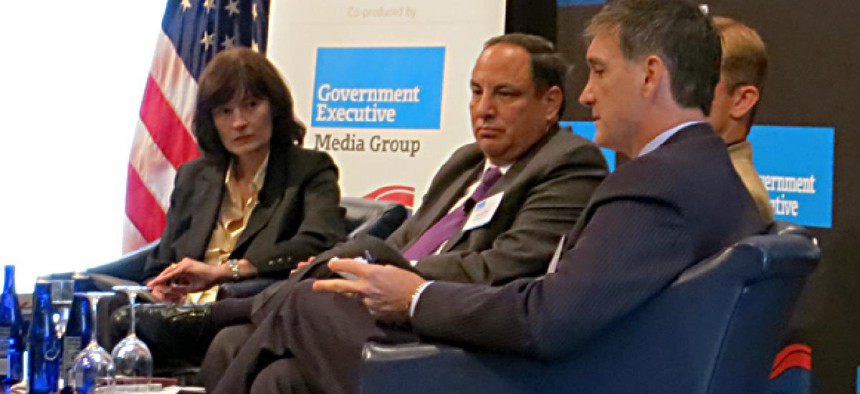Social media plays a growing role in open source intelligence, experts say

Sarah Scully/Nextgov.com
Analysts increasingly see value in monitoring Facebook, Twitter and other popular communications.
Analysts increasingly are turning to social media forums such as Facebook and Twitter to gather valuable information that can be used to help predict social, cultural and political shifts, and events before they might otherwise be apparent, intelligence community veterans Tuesday said at a panel discussion on open-source intelligence hosted by Government Executive.
“We take a large look at the world and see if there’s a surprise out there,” said Patrick O’Neil, analytic director of the Open Source Center for the Office of the Director of National Intelligence. “We’re trying to avoid a surprise.”
The intelligence community has long debated the value of open source intelligence, which is collected from public data, as opposed to covert or clandestine sources. While the panelists all were proponents of open source intelligence, they noted although social media offers significant new collection sources, its role should not be overstated.
“There are adopters of technology but that doesn’t mean they carry the voice of a nation or an entire populous,” said Craig Parisot, chief operating officer at Invertix, a technology company with more than a dozen patents in messaging, search and data mining innovations.
O’Neil said while only 20 percent of the world’s population uses social media, the huge volume of data makes processing information into actionable intelligence difficult. Despite those limitations, social media can provide valuable information for analysts, such as the identity of key influencers, he said.
“What we look at is impact,” he said.
He added while social media provides analysts with a wealth of new data, the problems of determining the veracity and meaning of that data are not all that different from those inherent in traditional intelligence collection methods.
“There are challenges, but they are challenges analysts are accustomed to dealing with,” O’Neil said. “It’s just [a matter of] translating traditional practices that we apply to all other information to social media.”
While traditional news media has sometimes blown the influence of social media out of proportion, its impact has been felt in major world events, especially in the Middle East. “Social media was not the cause of the Arab spring,” said David Abruzzino, director of the Open Source Intelligence Exchange at Fairmont State University, “but it was an enabler.”
Other areas in which social media has provided valuable intelligence include responding to natural disasters, monitoring potential irregularities in elections and evaluating security risks for elected officials.
“It doesn’t [necessarily] tell you what’s happening,” O’Neil said, “but it tells you where to look.”
As the intelligence community develops new technologies to process social media, analysts should keep in mind that people’s use of social media will continue to evolve.
“[We must] make sure we’re following the right trends in how people are using it,” Abruzzino said. “This is not going away, but how people use it is going to change the dynamic.”
NEXT STORY: Romney to announce veep pick via app






